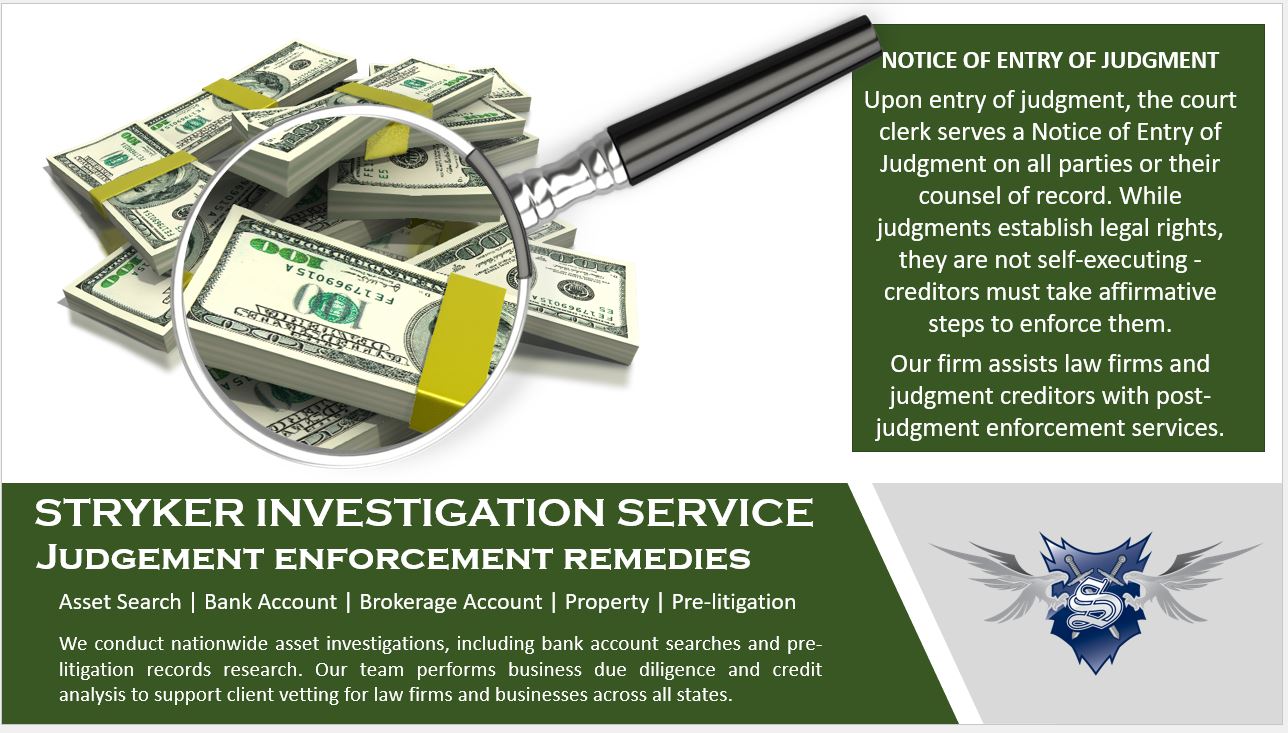
NEW JERSEY ASSET SEARCH INVESTIGATIONS
DOES A DEBTOR OWE YOU MONEY? DO YOU HAVE A JUDGMENT AGAINST THEM?
Licensed Private Investigator Since 2000
George Washington Bridge - GWB Between New Jersey and New York

WHAT IS A PERMISSIBLE PURPOSE? HOW DOES IT APPLY TO BANK AND FINANCIAL INVESTIGATIONS?
This summary does not discuss every scenario or anticipated use or subsequent authorization. It is intended to illuminate a convoluted and misinterpreted legal framework while providing general guidance on core principles and common applications. The information contained herein should not be construed as legal advice, and readers should consult with qualified legal counsel regarding their specific circumstances. While efforts have been made to ensure accuracy, laws and regulations are subject to change, and variations may exist across different jurisdictions. Nothing in this document creates an attorney-client relationship or serves as a substitute for professional legal consultation.
The legal framework governing access to nonpublic financial information operates through multiple federal statutes, establishing specific requirements for different scenarios. The Fair Credit Reporting Act (FCRA) serves as a primary foundation, mandating consumer authorization for credit report access while explicitly prohibiting its use for determining insurance, credit, or employment eligibility. FCRA Section 6802(e)(8) provides essential exceptions, permitting disclosures when necessary to comply with federal, state, or local laws, respond to authorized civil or criminal investigations, address regulatory requirements, or fulfill judicial process obligations.
When accessing bank or brokerage records, requestors must demonstrate a valid permissible purpose and comply with court orders or civil judgments, while remaining subject to the Right to Financial Privacy Act restrictions specifically governing government access. Financial institutions bear the responsibility of verifying the requestor’s authority before disclosure. This comprehensive framework, incorporating 28 U.S.C. Chapter 176 Fair Debt Collection Procedures and 15 U.S.C. Title 15 Privacy Provisions, explicitly establishes that exceptions (6)(A), (7), and (8) and (D) grant access to persons holding a legal or beneficial interest relating to the consumer; or (E) to persons acting in a fiduciary or representative capacity on behalf of the consumer; but require demonstration of a valid permissible purpose for both pre-civil and post-civil proceedings. Pre-civil proceedings are specifically defined as subpoenas, search warrants, or other Judicial Orders. Post-civil proceedings are defined as Judicial Orders or Judgments, which constitute the judge’s rulings at the conclusion of an adversary proceeding requiring the debtor to pay the amount awarded in the Judgement or Judicial Order resulting from the proceedings. All financial information access must align with these federal statutes while simultaneously complying with applicable state privacy laws and institution-specific requirements, ensuring a balanced approach between necessary information access and privacy protection.
This document does not address all applicable laws, regulations, or conditions that may be relevant to any particular situation. References to specific scenarios or applications should not be interpreted as endorsements or recommendations. The authors reserve the right to modify, update, or withdraw any portion of this content without notice. By proceeding with this document, readers acknowledge these limitations and disclaimers.
The authors and publishers expressly disclaim all liability for any actions taken or not taken based on the contents of this document. This summary may be incomplete or outdated at the time of reading, and subsequent legislative, regulatory, or judicial developments may impact its accuracy. Readers should verify any information that may affect their legal rights or obligations. Any examples provided are for illustrative purposes only and may not apply to specific situations.
New Jersey Asset Search: Expert PI provides best-in-class actionable search results for attorneys and creditors seeking judgment enforcement remedies.
New Jersey Asset Search Expert Private Investigator. Stryker delivers best-in-class statewide and nationwide bank account searches, pre-litigation, probate, and estate discovery, judgment enforcement remedies, and comprehensive judgment enforcement remedies for law firms and businesses. Our investigation agency partners with New Jersey law firms pursuing substantial judgment recoveries, leveraging sophisticated investigative techniques and the full scope of legal remedies to secure enforcement throughout the state of New York and New Jersey.
From conducting thorough pre-litigation and pre-judgment asset searches to locating specific bank accounts for existing civil judgments, our private investigators excel in uncovering actionable intelligence. At Stryker, we approach each investigation with unwavering determination and persistence, committed to achieving equitable outcomes for our clients. Unlike larger firms where cases can become merely numbers, our private investigation agency provides focused, individualized attention to each case and client. We offer complimentary consultations with experienced private investigators who understand the complexities of your situation and can develop targeted strategies for your specific needs.
- Discover effective strategies for New Jersey asset searches to enhance your professional due diligence and uncover hidden financial resources.
- Navigate complex asset searches with our dedicated team. We offer focused investigations to support your professional needs.
- Uncover effective asset search strategies to elevate your professional due diligence and identify hidden financial opportunities.
Our firm specializes in comprehensive New Jersey asset searches and investigative services tailored to meet the complex needs of legal professionals throughout their case lifecycle. We offer extensive pre-litigation support services, including thorough background investigations, advanced skip-tracing, professional witness interviews, and detailed financial analyses across domestic accounts. Our asset investigation platform delivers actionable intelligence for attorneys pursuing judgment enforcement, with capabilities extending to public records examination and permissible financial account searches.
We understand that each case is unique, and our tailored approach guarantees that we address the specific needs of our clients, providing them with the insights necessary to make informed decisions. Trust Stryker Investigation Services to be your partner in navigating the complexities of asset searches and recovery, ensuring that you have the best possible chance for success in your legal endeavors New Jersey
STATEWIDE BANK SEARCH
BUSINESS ASSET SEARCH
OFFSHORE BANK SEARCH
BROKERAGE ACCOUNTS
INDIVIDUAL'S ASSEST
STATEWIDE BANK ACCOUNT SEARCH ON AN INDIVIDUAL – This search returns all open bank accounts found from multiple banks. You will receive a list of all banks located, bank names and addresses, types of accounts, balances, the institution’s name and address, and end-of-the-day account balance.
BUSINESS ASSETS
STATEWIDE BANK ACCOUNT SEARCH ON A BUSINESS – This search returns all open bank accounts found from multiple banks. You will receive a list of all banks located, bank names and addresses, types of accounts, balances, the institution’s name and address, and end-of-the-day account balance.
BROKERAGE ACCOUNT
BROKERAGE ACCOUNT SEARCH Brokerage company investment account used to buy and sell securities, stocks, bonds, and mutual funds. This search returns all open brokerage accounts found in multiple firms. You will receive a list of all accounts located, as well as establishment names, addresses, and balances. This will include end-of-the-day account balance information.
New Jersey State Asset Search Investigations
ASSET SEARCH INVESTIGATION TYPES & SERVICES
A statewide business search provides a focused examination within the borders of a specific state. A statewide asset search for an individual delves deep into their financial footprint within a specific state. This investigation examines county recorder offices for real property ownership, including primary residences, vacation homes, rental properties, and undeveloped land. It explores state motor vehicle records for registered cars, boats, aircraft, and recreational vehicles. The search examines state-level civil court records for any litigation that might reveal asset disclosures, divorce settlements, or probate matters. State professional licensing boards are checked for occupational licenses, which can indicate sources of income or business interests. Local tax assessor records reveal property tax history and potential ownership of multiple properties through different entities. The search also examines state UCC filings to uncover secured transactions and business equipment.
Licensed private investigators conduct statewide asset searches using privileged access to restricted databases and data brokers - resources unavailable to the general public. This authorized access, granted only to PIs who maintain active state licensure and meet strict compliance requirements, enables thorough and lawful asset investigations. Through these comprehensive resources, investigators examine county recorder offices for real property ownership, uncovering primary residences, vacation homes, and undeveloped land. The search extends to state motor vehicle records for registered vehicles, boats, and aircraft, while our local asset discovery process reveals crucial information from state civil court records, including asset disclosures, divorce settlements, and probate matters. To complete this thorough investigation, we examine state professional licensing boards, local tax assessor records, and UCC filings, providing legal professionals with vital financial intelligence for their proceedings.
Individual Nationwide Asset Search. Moving to a broader scope, a nationwide asset search expands this investigation exponentially across all states, creating an intricate web of financial intelligence. This comprehensive search examines federal bankruptcy courts for past filings or pending cases that might reveal asset declarations. It scans federal tax liens and civil judgments in all jurisdictions. The investigation covers property records in all 50 states to uncover real estate holdings that might be strategically placed in different locations. Federal civil court records are examined for asset disclosures in litigation across state lines. The search includes nationwide vehicle registrations and aircraft registrations with the FAA. Corporate records across all states are checked to reveal business interests, partnerships, and corporate officer positions. Federal contracts and government payments are investigated to identify potential income sources. The nationwide search also examines pension and retirement account registries, unclaimed property databases in all states, and national databases for professional licenses.
Licensed private investigators conduct statewide asset searches using privileged access to restricted databases and data brokers - resources unavailable to the general public. This authorized access, granted only to PIs who maintain active state licensure and meet strict compliance requirements, enables thorough and lawful asset investigations. Through these comprehensive resources, investigators examine county recorder offices for real property ownership, uncovering primary residences, vacation homes, and undeveloped land. The search extends to state motor vehicle records for registered vehicles, boats, and aircraft, while our local asset discovery process reveals crucial information from state civil court records, including asset disclosures, divorce settlements, and probate matters. To complete this thorough investigation, we examine state professional licensing boards, local tax assessor records, and UCC filings, providing legal professionals with vital financial intelligence for their proceedings.
Brokerage and Investment Asset Search Services. Our specialized financial portfolio search services target securities and investment holdings across multiple platforms. This investment asset search examines registered securities accounts, retirement funds, and pension accounts. Our financial asset location services trace mutual fund holdings, stock certificates, and bond investments through transfer agents and registrars. The investigation includes commodity trading accounts, offshore investment accounts, and international securities holdings, providing complete visibility into investment patterns and financial institution relationships.
A brokerage account search specifically targets securities and investment holdings across multiple financial platforms. This specialized search examines registered securities accounts, checking for both active and dormant investment accounts. It investigates retirement accounts including 401(k)s, IRAs, and pension funds. The search covers mutual fund holdings, looking for both direct investments and fund participation through employers or investment groups. Stock certificates and bond holdings are traced through transfer agents and registrars. Commodity trading accounts are examined for futures and options trading activity. The investigation includes checking for offshore investment accounts and international securities holdings where possible. This search can also reveal investment patterns, trading history, and relationships with multiple financial institutions.
Licensed private investigators conduct statewide asset searches using privileged access to restricted databases and data brokers - resources unavailable to the general public. This authorized access, granted only to PIs who maintain active state licensure and meet strict compliance requirements, enables thorough and lawful asset investigations. Through these comprehensive resources, investigators examine county recorder offices for real property ownership, uncovering primary residences, vacation homes, and undeveloped land. The search extends to state motor vehicle records for registered vehicles, boats, and aircraft, while our local asset discovery process reveals crucial information from state civil court records, including asset disclosures, divorce settlements, and probate matters. To complete this thorough investigation, we examine state professional licensing boards, local tax assessor records, and UCC filings, providing legal professionals with vital financial intelligence for their proceedings.
EXPERT WITNESS EXPERIENCE
The difference between them (other agencies) and us is that Stryker’s founder is a “Designated Expert Witness” for Asset Search Investigation and their permissible purpose in Comerica vs. Reid in relation to “the proper legal means to acquire non-public detailed information on the debtor’s stocks bonds, bank accounts in conjunction with investigative searches.”
Nowadays, it seems like everyone proclaims to be an expert in something. However, who qualifies as an expert witness when it comes to court cases? Experts are qualified according to several factors, including but not limited to the number of years they have practiced in their respective fields and work experience related to the case. They may be called as consultants to a case and used to give testimony at trial. However, not everyone can qualify as an “expert,” and not all types of expert testimony may be permitted. Rules about expert witnesses are set by state and federal rules of evidence, depending on whether your case is in state or federal court.
NEW JERSEY BANK LEVY Enforcement Measures:
New Jersey follows a distinct approach to bank levies under N.J.S.A. 2A:17-50 and Rule 4:59-1(g), incorporating specific protections and procedures that differ from other states. When a creditor obtains a judgment, they must first secure a writ of execution from the court. This writ is then served by a court officer (typically a Special Civil Part Officer or Sheriff’s Officer) directly to the bank. Unlike states like New York that have a separate restraining notice period, New Jersey implements an immediate levy process where the bank must freeze the account upon receiving the writ.
New Jersey provides specific protections for account holders through an automated review process. Banks must conduct an account review within two business days of receiving the levy to identify and protect certain exempt funds, such as Social Security benefits, veterans’ benefits, and other federal benefits that were electronically deposited during the two months preceding the levy. This protection extends to an amount equal to the sum of these deposits or the current balance, whichever is lower. The state also recognizes additional exemptions under N.J.S.A. 2A:17-19, including certain pension benefits and life insurance proceeds.
The execution process in New Jersey requires banks to hold the levied funds for 20 days before releasing them to the creditor. This holding period is significantly longer than states like New York’s two-day transfer requirement but shorter than some other jurisdictions. During this time, the debtor can file a claim for exemption or motion to vacate the levy with the court. Banks may charge a processing fee of up to $25 for handling the levy, which is lower than New York’s $50 fee but still provides compensation for the administrative burden.
Key elements that distinguish New Jersey’s approach:
- Single-phase levy process with immediate account freeze upon receiving the writ
- Two-day automated review requirement for identifying and protecting exempt funds
- 20-day holding period before funds can be released to creditor
- Specific statutory exemptions under N.J.S.A. 2A:17-19 protecting certain types of income and assets
The bank must promptly notify the account holder of the levy and provide information about exemption rights and the process for claiming them. The notification must include specific forms and instructions for filing an exemption claim with the court. This system balances creditor rights with debtor protections while maintaining clear procedural requirements that all parties must follow. The process emphasizes protecting exempt funds while still providing creditors with an effective means of collecting legitimate debts through the banking system.
Areas we provide asset search and investigations services:
New Jersey Metropolitan Areas: Newark, Jersey City, Hoboken, Hackensack, Paterson, Elizabeth, Union City, Bayonne, Fort Lee, Secaucus, Weehawken, West New York, North Bergen, Rutherford, East Rutherford
Central New Jersey: Trenton, Princeton, New Brunswick, Edison, Woodbridge, Piscataway, East Brunswick, South Brunswick, Franklin Township, Plainsboro, Montgomery, South Plainfield, Metuchen
Northern New Jersey: Morristown, Paramus, Englewood, Wayne, Montclair, Clifton, Passaic, Ridgewood, Teaneck, Garfield, Bloomfield, Nutley, Cedar Grove, Glen Ridge, West Orange, South Orange
Southern New Jersey: Camden, Cherry Hill, Mount Laurel, Marlton, Voorhees, Moorestown, Maple Shade, Pennsauken, Haddonfield, Collingswood, Cinnaminson, Burlington, Willingboro
Jersey Shore Region: Atlantic City, Long Branch, Red Bank, Asbury Park, Point Pleasant, Ocean City, Cape May, Toms River, Brick, Seaside Heights, Belmar, Spring Lake, Manasquan, Sea Girt
Pennsylvania Service Areas: Philadelphia Metropolitan Area, Bucks County, Montgomery County, Chester County, Delaware County
Delaware Service Areas: Wilmington, Newark, Dover, New Castle, Bear, Glasgow, Middletown
Eastern Pennsylvania Cities: Allentown, Bethlehem, Easton, Reading, Lancaster, West Chester, King of Prussia, Plymouth Meeting, Conshohocken
Financial Centers:
- Newark Financial District
- Jersey City Financial District
- Philadelphia Financial District
- Wilmington Business District
- Princeton Business Corridor
- King of Prussia Business Park
These locations represent areas with significant business activity, financial institutions, and legal communities where asset investigations, bank levies, and legal support services are frequently required. The list focuses on population centers with substantial commercial and legal activity, particularly relevant for banking investigations, asset searches, and corporate due diligence work.







